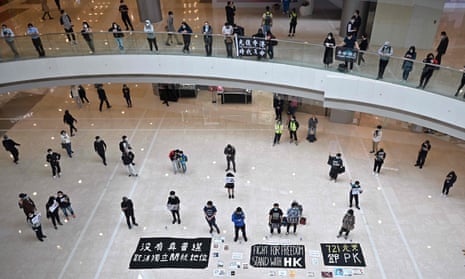China is prosecuting its first foreign national for involvement in the Hong Kong protests, which racked the city for much of last year.
State media said on Friday that Guangzhou city’s national security bureau had finished investigations into Lee Henley Hu Xiang, a Belizean national and Taiwan resident, and his case had been transferred to the Guangzhou people’s procuratorate for prosecution.
“Investigations by the national security agency confirmed that the suspect provided a large amount of funds to hostile elements in the United States, colluded with foreign anti-China forces to intervene in Hong Kong affairs, and funded the implementation of criminal activities that endangered our national security,” said Guangdong province’s state newspaper, the Nanfang Daily.
The Guangzhou people’s procuratorate told the Guardian there was no official statement on the case at this time.
Lee reportedly went missing in August last year after travelling from Taiwan to Shenzhen. In September the Taiwan affairs office of China’s state council said he was being investigated for “engaging in criminal acts that endanger state security”, and in late November Chinese media revealed he had been arrested in Guangzhou.
At least three other Taiwan residents were arrested around the same time, for charges relating to assisting foreign forces in relation to Hong Kong or endangering national security.
Since the protests began last summer the Chinese government and state media has repeatedly blamed “foreign forces”, in particular the UK and US, for creating chaos in Hong Kong and supporting the protests.
“Some foreign forces are seizing the opportunity to advance their own strategy to hurt China by trying to create havoc in Hong Kong,” said a China Daily editorial in June.
“The US should know one thing, that Hong Kong is China’s Hong Kong and we do not allow any foreign interference,” said the foreign ministry spokeswoman, Hua Chunying, about the unrest in July.
In November the vice-foreign minister told the US to “stop meddling in Hong Kong affairs and interfering in China’s internal matters”.
Lee’s case is the first prosecution of a foreigner in relation to the protests, but more than 7,000 citizens, mostly young Hong Kongers, have been charged or prosecuted.
On Friday the pro-democracy former legislator Au Nok-hin was sentenced to 140 hours of community service after being convicted of assault by yelling through a loudspeaker and damaging the hearing of a police officer.
Despite consistent accusations of brutality against demonstrators, no police officers have faced charges.
Crackdowns on those leading and participating in the pro-democracy protests reached a crescendo last week, with the arrest of 15 senior figures including the 81-year-old barrister and founder of the Democratic party, Martin Lee.
Interventions by Beijing’s top bodies in Hong Kong have also deepened the city’s political crisis, ahead of legislative council elections in September. Last year Hong Kongers voted overwhelmingly in favour of pro-democracy candidates in the district council elections, despite the damage done by the protests to the city’s social and economic life.
It is widely anticipated that once coronavirus physical distancing measures are lifted the protests will return, and that they will have been spurred on by recent events.
Before he was arrested, Martin Lee told the Guardian he believed Beijing and its supporters were “resorting to all kinds of tricks” to ensure pro-democracy candidates could not run in September.
“They are now trying to do everything to help pro-Beijing candidates,” he said. “But even some pro-Beijing legislators said that it could be counter-productive.”
Additional reporting by Pei Lin Wu
